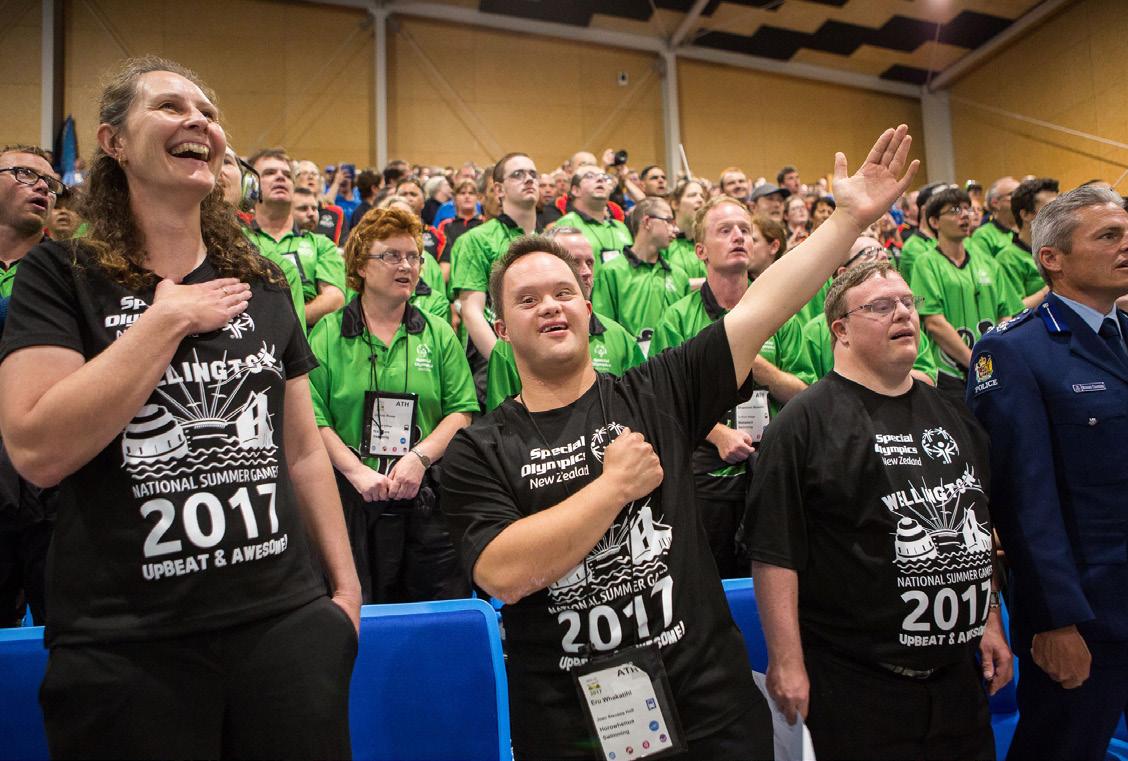
3 minute read
Champion Centre One year until the Special Olympics National Summer
Common sense, science, and singing at the Champion Centre
By Dr Lauren Porter Registered clinical social worker & Clinical Director at the Champion Centre
All of us have seen - or been - the parent singing Twinkle Twinkle Little Star to our baby. We configure our fingers into a diamond and lift them up into the air, all while singing and smiling and watching our baby’s face. We naturally sing soothing soft tones when our baby cries and try our best at upbeat songs from the Wiggles whilst we drive with them in the car. At the Champion Centre, music and singing is a part of every child’s programme. Parents and children sit together, led by a music specialist. We sing, play instruments, move our bodies, and twirl with ribbons. Singing, it seems, is a natural part of childhood. But why? There are many reasons for music and singing in human culture. We use song for communication, to pass on cultural messages, to pass the time, to understand our world, to integrate our feelings, to express ourselves, to pass the time, and to have fun. Recent research indicates that singing has specific impact on infants and may reveal something unique about infants with Down syndrome. According to 2015 research out of the USA, when mothers sing to their babies for two minutes, babies are supported in their ability to self-regulate. Selfregulation is an oft-used term that refers to a person’s ability to manage and respond to their internal states. In other words, as we experience emotions, are we able to understand and flexibly respond to them, or do they end up controlling us? Self-regulation has two key components: managing our attention and managing our arousal. Learning self-regulation is a developmental skill that requires significant help from our caregivers. The younger a person, the more help they will

likely need. Over time, as children age, they begin to be able to regulate more and more on their own. Even adults still need help with regulation from time to time, especially during periods of great stress. Babies with Down syndrome can experience challenges in the realm of self-regulation. Due to differences in neuroanatomy, babies with Down syndrome can struggle with slower processing of stimuli and attention, difficulty comprehending the emotional displays of others, and low arousability that often co-exists alongside a difficulty coming back to calm once excited. Strategies to support self-regulation can be very important for children for whom this doesn’t emerge easily. Research demonstrates that two minutes of a parent singing to their baby supports self-regulation, and is therefore very important. Singing is a free, easy, available option for any parent. Babies don’t mind if we don’t have perfect pitch or even if we forget the words. According to the research, singing to our children is very different to just playing them music. Singing to an infant supports joint attention, dyadic interaction, and a positive experience for both parent and child. Singing to a baby helps the baby follow the parent’s pattern of modulated, flexible responses; as the song changes, the voice and actions change. Singing to a baby also gives the opportunity to incorporate objects and props such as looking out the window for something in a song or twirling a ribbon on a stick. For babies with Down syndrome, this incorporation of external things to focus on is another important finding of the research. The requirement to focus both on mummy’s face and something else helps the baby learn to switch the focus of attention and learn not to look only through one lens or rely solely on mum to navigate the world. Switching back and forth like isn’t easy for a baby who may have a slower processing time, hence another way that singing to a child can support developmental learning throughout the lifespan. Sometimes research is all about science, sometimes it’s all about common sense. In the case of singing to our babies, it’s about both. Reference: de l’Etoile, SK (2015). SelfRegulation and Infant-Directed Singing in Infants with Down Syndrome. Journal of Music Therapy, 52 (2), 195-220.
Paige Goddard rocking out at music group







